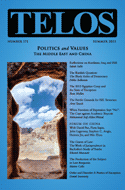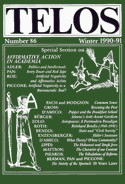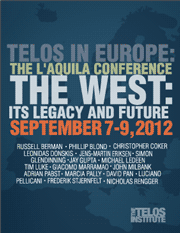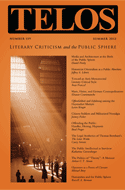By Matteo Calla · Thursday, July 30, 2015  This article places Benjamin’s late work in dialogue with recent attempts in media theory and structuralism to think the subject and historical contingency together. It argues their apparent incompatibility is reflected in Benjamin’s writing in the form of a recurrent contradiction between historical materialism and transhistorical theology. Through a reconstruction of the theorist’s historicization of an earlier theological theory of the fall of language in his Marxian-inflected work of the 1930’s, it claims that Benjamin initiates a historicist reconceptualization of the impasse of the Kantian subject onto being as the product of a particular field of mediation arising with mass modernity. Yet following the rejection of his nascent version of the Arcades Project by Adorno and the Marxist Institute for Social Research in 1938, theology returns as an attempt to reconceive of an aesthetic-formal break with this impasse. Benjamin’s late theorization of his materialist historiography thus represents a dialectical attempt to think materialism and theology, history and being together, with the aim of mediating not only distraction, but a revolutionary destruction of the subject and the historical order producing it. This article places Benjamin’s late work in dialogue with recent attempts in media theory and structuralism to think the subject and historical contingency together. It argues their apparent incompatibility is reflected in Benjamin’s writing in the form of a recurrent contradiction between historical materialism and transhistorical theology. Through a reconstruction of the theorist’s historicization of an earlier theological theory of the fall of language in his Marxian-inflected work of the 1930’s, it claims that Benjamin initiates a historicist reconceptualization of the impasse of the Kantian subject onto being as the product of a particular field of mediation arising with mass modernity. Yet following the rejection of his nascent version of the Arcades Project by Adorno and the Marxist Institute for Social Research in 1938, theology returns as an attempt to reconceive of an aesthetic-formal break with this impasse. Benjamin’s late theorization of his materialist historiography thus represents a dialectical attempt to think materialism and theology, history and being together, with the aim of mediating not only distraction, but a revolutionary destruction of the subject and the historical order producing it.
Continue reading →
By Lukas Szrot · Tuesday, November 25, 2014 As Popper has written in several articles and his autobiography, he encountered Marxism as a young man in Austria around 1919. For two or three months he called himself a communist, but soon turned against the doctrine after the deaths of pro-communist demonstrators was justified with what Popper considered pseudo-scientific jargon. These events made him a fallibilist acutely aware of the distinction between dogmatic and critical thinking. (34)
 This emotionally powerful and philosophically significant experience colored Popper’s views of Marxism, the call for revolutionary social change, and the utopianism that foments it. In light of this, it is not difficult to see why Popper and (in particular early) Critical Theorists might have found much about which to disagree. Robert D’Amico discusses myriad points of contrast between Karl Popper and the Frankfurt School, though from the outset he acknowledges that the “infamous ‘methodology dispute’ in German sociology that occurred primarily between Popper and Adorno . . . is best described as a misfire” (33). Despite this alleged “misfire,” D’Amico’s analysis raises profound questions that continue to gain attention and prod ongoing debate in terms of the philosophy, theory, and methodology of the social sciences. This emotionally powerful and philosophically significant experience colored Popper’s views of Marxism, the call for revolutionary social change, and the utopianism that foments it. In light of this, it is not difficult to see why Popper and (in particular early) Critical Theorists might have found much about which to disagree. Robert D’Amico discusses myriad points of contrast between Karl Popper and the Frankfurt School, though from the outset he acknowledges that the “infamous ‘methodology dispute’ in German sociology that occurred primarily between Popper and Adorno . . . is best described as a misfire” (33). Despite this alleged “misfire,” D’Amico’s analysis raises profound questions that continue to gain attention and prod ongoing debate in terms of the philosophy, theory, and methodology of the social sciences.
Continue reading →
By Simon Glendinning · Monday, January 7, 2013 The following paper was presented at Telos in Europe: The L’Aquila Conference, held on September 7-9, 2012, in L’Aquila, Italy.
 How should we conceive the distinctive character, the “particular rarity,” of the wearing and growing of the contemporary world? How should we come to terms with our time? What words can we find that are fitting for its specificity when so many of the words we have found fitting hitherto, especially promising words about the course of human history and its political hopes, its hopes in the political (modernity, Enlightenment, civilization, socialism, etc.) sound more and more like the road signs of another age? How should we conceive the distinctive character, the “particular rarity,” of the wearing and growing of the contemporary world? How should we come to terms with our time? What words can we find that are fitting for its specificity when so many of the words we have found fitting hitherto, especially promising words about the course of human history and its political hopes, its hopes in the political (modernity, Enlightenment, civilization, socialism, etc.) sound more and more like the road signs of another age?
Are we not floundering today? Isn’t this, at least in part, what we need to understand, to make intelligible? So we might look out for writings, wherever they come from, that speak to and speak from this world, a world which today, it seems, more than ever, “wears as it grows.”
Continue reading →
By Jeffrey S. Librett · Monday, July 16, 2012 Jeffrey S. Librett’s “Historicist Orientalism as a Public Absolute: on Herder’s Typo-teleology” appears in Telos 159 (Summer 2012). Read the full version online at the Telos Online website, or purchase a print copy of the issue here.
 After the Enlightenment attempted to replace the revealed public absolute with a self-grounding universal rationality, an attempt the Counterenlightenment charged with arbitrariness, the historicist discourse tried to establish the narrative of the origin and development of culture as a public, objective absolute that escapes this critique. In this narrative, the Orient functioned as a fetish of origin subserving the disavowal of the lack of grounding that the Enlightenment had introduced. In historicist Orientalism, the Occident appropriated this alien origin by applying the logic of medieval typology—hitherto the principal model for the supersession of Judaism by Christianity—to the Oriental-Occidental relation in general. Historicist Orientalism constituted a typological teleology to assert the supersession of East by West as a quasi-secularized, objective, public absolute. In the anxiety-inducing metaphysical void of modernity, the story of culture provided an “orientation” that revelation failed to deliver. Herder’s Ideas for a Philosophy of the History of Humanity (1784-91) was one of the most important inaugural instances of this historicist Orientalism in the German tradition. The essay retraces the outlines of the problematic logic through which Herder recounted the passage from the origins of culture in Asia to their Western appropriation. Situating the Jews as the realization of the Oriental prefiguration, Herder’s discourse provides an exemplary version of the passage from the Judaeo-Christian application of typology to its Orientalist generalization and secularization. After the Enlightenment attempted to replace the revealed public absolute with a self-grounding universal rationality, an attempt the Counterenlightenment charged with arbitrariness, the historicist discourse tried to establish the narrative of the origin and development of culture as a public, objective absolute that escapes this critique. In this narrative, the Orient functioned as a fetish of origin subserving the disavowal of the lack of grounding that the Enlightenment had introduced. In historicist Orientalism, the Occident appropriated this alien origin by applying the logic of medieval typology—hitherto the principal model for the supersession of Judaism by Christianity—to the Oriental-Occidental relation in general. Historicist Orientalism constituted a typological teleology to assert the supersession of East by West as a quasi-secularized, objective, public absolute. In the anxiety-inducing metaphysical void of modernity, the story of culture provided an “orientation” that revelation failed to deliver. Herder’s Ideas for a Philosophy of the History of Humanity (1784-91) was one of the most important inaugural instances of this historicist Orientalism in the German tradition. The essay retraces the outlines of the problematic logic through which Herder recounted the passage from the origins of culture in Asia to their Western appropriation. Situating the Jews as the realization of the Oriental prefiguration, Herder’s discourse provides an exemplary version of the passage from the Judaeo-Christian application of typology to its Orientalist generalization and secularization.
Continue reading →
|
|
 This article places Benjamin’s late work in dialogue with recent attempts in media theory and structuralism to think the subject and historical contingency together. It argues their apparent incompatibility is reflected in Benjamin’s writing in the form of a recurrent contradiction between historical materialism and transhistorical theology. Through a reconstruction of the theorist’s historicization of an earlier theological theory of the fall of language in his Marxian-inflected work of the 1930’s, it claims that Benjamin initiates a historicist reconceptualization of the impasse of the Kantian subject onto being as the product of a particular field of mediation arising with mass modernity. Yet following the rejection of his nascent version of the Arcades Project by Adorno and the Marxist Institute for Social Research in 1938, theology returns as an attempt to reconceive of an aesthetic-formal break with this impasse. Benjamin’s late theorization of his materialist historiography thus represents a dialectical attempt to think materialism and theology, history and being together, with the aim of mediating not only distraction, but a revolutionary destruction of the subject and the historical order producing it.
This article places Benjamin’s late work in dialogue with recent attempts in media theory and structuralism to think the subject and historical contingency together. It argues their apparent incompatibility is reflected in Benjamin’s writing in the form of a recurrent contradiction between historical materialism and transhistorical theology. Through a reconstruction of the theorist’s historicization of an earlier theological theory of the fall of language in his Marxian-inflected work of the 1930’s, it claims that Benjamin initiates a historicist reconceptualization of the impasse of the Kantian subject onto being as the product of a particular field of mediation arising with mass modernity. Yet following the rejection of his nascent version of the Arcades Project by Adorno and the Marxist Institute for Social Research in 1938, theology returns as an attempt to reconceive of an aesthetic-formal break with this impasse. Benjamin’s late theorization of his materialist historiography thus represents a dialectical attempt to think materialism and theology, history and being together, with the aim of mediating not only distraction, but a revolutionary destruction of the subject and the historical order producing it.  This emotionally powerful and philosophically significant experience colored Popper’s views of Marxism, the call for revolutionary social change, and the utopianism that foments it. In light of this, it is not difficult to see why Popper and (in particular early) Critical Theorists might have found much about which to disagree. Robert D’Amico discusses myriad points of contrast between Karl Popper and the Frankfurt School, though from the outset he acknowledges that the “infamous ‘methodology dispute’ in German sociology that occurred primarily between Popper and Adorno . . . is best described as a misfire” (33). Despite this alleged “misfire,” D’Amico’s analysis raises profound questions that continue to gain attention and prod ongoing debate in terms of the philosophy, theory, and methodology of the social sciences.
This emotionally powerful and philosophically significant experience colored Popper’s views of Marxism, the call for revolutionary social change, and the utopianism that foments it. In light of this, it is not difficult to see why Popper and (in particular early) Critical Theorists might have found much about which to disagree. Robert D’Amico discusses myriad points of contrast between Karl Popper and the Frankfurt School, though from the outset he acknowledges that the “infamous ‘methodology dispute’ in German sociology that occurred primarily between Popper and Adorno . . . is best described as a misfire” (33). Despite this alleged “misfire,” D’Amico’s analysis raises profound questions that continue to gain attention and prod ongoing debate in terms of the philosophy, theory, and methodology of the social sciences.  How should we conceive the distinctive character, the “particular rarity,” of the wearing and growing of the contemporary world? How should we come to terms with our time? What words can we find that are fitting for its specificity when so many of the words we have found fitting hitherto, especially promising words about the course of human history and its political hopes, its hopes in the political (modernity, Enlightenment, civilization, socialism, etc.) sound more and more like the road signs of another age?
How should we conceive the distinctive character, the “particular rarity,” of the wearing and growing of the contemporary world? How should we come to terms with our time? What words can we find that are fitting for its specificity when so many of the words we have found fitting hitherto, especially promising words about the course of human history and its political hopes, its hopes in the political (modernity, Enlightenment, civilization, socialism, etc.) sound more and more like the road signs of another age?  After the Enlightenment attempted to replace the revealed public absolute with a self-grounding universal rationality, an attempt the Counterenlightenment charged with arbitrariness, the historicist discourse tried to establish the narrative of the origin and development of culture as a public, objective absolute that escapes this critique. In this narrative, the Orient functioned as a fetish of origin subserving the disavowal of the lack of grounding that the Enlightenment had introduced. In historicist Orientalism, the Occident appropriated this alien origin by applying the logic of medieval typology—hitherto the principal model for the supersession of Judaism by Christianity—to the Oriental-Occidental relation in general. Historicist Orientalism constituted a typological teleology to assert the supersession of East by West as a quasi-secularized, objective, public absolute. In the anxiety-inducing metaphysical void of modernity, the story of culture provided an “orientation” that revelation failed to deliver. Herder’s Ideas for a Philosophy of the History of Humanity (1784-91) was one of the most important inaugural instances of this historicist Orientalism in the German tradition. The essay retraces the outlines of the problematic logic through which Herder recounted the passage from the origins of culture in Asia to their Western appropriation. Situating the Jews as the realization of the Oriental prefiguration, Herder’s discourse provides an exemplary version of the passage from the Judaeo-Christian application of typology to its Orientalist generalization and secularization.
After the Enlightenment attempted to replace the revealed public absolute with a self-grounding universal rationality, an attempt the Counterenlightenment charged with arbitrariness, the historicist discourse tried to establish the narrative of the origin and development of culture as a public, objective absolute that escapes this critique. In this narrative, the Orient functioned as a fetish of origin subserving the disavowal of the lack of grounding that the Enlightenment had introduced. In historicist Orientalism, the Occident appropriated this alien origin by applying the logic of medieval typology—hitherto the principal model for the supersession of Judaism by Christianity—to the Oriental-Occidental relation in general. Historicist Orientalism constituted a typological teleology to assert the supersession of East by West as a quasi-secularized, objective, public absolute. In the anxiety-inducing metaphysical void of modernity, the story of culture provided an “orientation” that revelation failed to deliver. Herder’s Ideas for a Philosophy of the History of Humanity (1784-91) was one of the most important inaugural instances of this historicist Orientalism in the German tradition. The essay retraces the outlines of the problematic logic through which Herder recounted the passage from the origins of culture in Asia to their Western appropriation. Situating the Jews as the realization of the Oriental prefiguration, Herder’s discourse provides an exemplary version of the passage from the Judaeo-Christian application of typology to its Orientalist generalization and secularization. 

